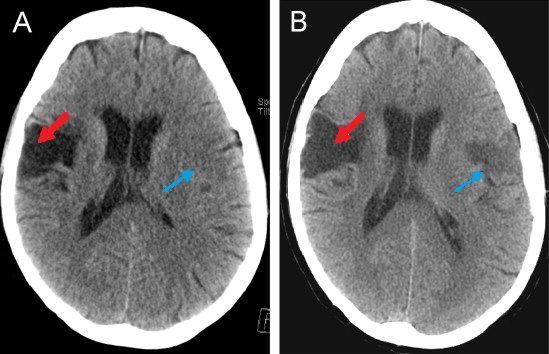Playlist
Show Playlist
Hide Playlist
Ischemic Stroke: Characteristics
-
Slides 01 Stroke Neuropathology I.pdf
-
Reference List Pathology.pdf
-
Download Lecture Overview
00:01 What are the characteristics of our ischemic stroke? Well, it's important to understand where did my stroke take place? We call it a Cerebral Vascular Accident, don't we? A CVA. 00:11 In the cerebral vascular accident, where was the location of this particular stroke? Which blood vessel was it affecting? Was it a large blood vessel? Was it a little blood vessel? What part of the brain was affected? Was it a dominant or non-dominant side? Do you understand that at this juncture, it would be a really good idea for you have a firm handle of the neuroanatomy, right? Make sure you know where all the important significant blood vessels are located. 00:39 What part of the brain that they are supplying? And make sure you understand that part of the brain, what is it responsible for? What kind of activity? Is a motor or sensory? So on and so forth. 00:53 Those kind of questions become important for us. 00:55 And it's important that you understand what part of the brain is responsible for what kind of function? Maximal at onset. 01:04 Remember that husband of sitting on a recliner chair, watching TV and all of a sudden boom... 01:11 it happen quickly. 01:12 Slurring of the speech, was unable to walk, maybe blurring of the vision. 01:17 That's characteristic of a stroke. 01:20 May have a stepwise progression depending on the etiology. 01:23 Now, you've heard of multi infarct dementia may be perhaps. 01:27 So therefore, as you have more and more of the blood vessels that are being blocked and blocked and blocked. 01:33 And then the dementia that is setting in takes a step wise like well, deterioration. 01:41 Stop further about risk factors. 01:44 Hypertension, being one of the most common common risk factors for ischemic stroke. 01:50 And if it is hypertension, then what made them happen to the blood vessel focally? Good. 01:56 Talking about benign, chronic type hypertension. 01:59 And you know, about Hyaline arteriosclerosis. 02:02 That could be a possible risk factor. 02:05 What about diabetes itself? Diabetes... 02:08 most of the time accompanied by hyperlipidemia, resulting in atherosclerosis. 02:13 Stroke. 02:14 Tobacco with history of stroke or TIA. 02:17 Now, smoking itself or tobacco is a injurious agent. 02:21 Heart disease. 02:22 For example, we talked about atrial fibrillation. 02:25 What if there was valvular disease or cardiomyopathy? Take a look at those conditions, please. 02:30 All those conditions are the perfect environment to develop a thrombus and then eventually embolize, resulting in a type of focal stroke. 02:40 Patient has hypercholesterolemia and age. 02:43 These are common sense type of risk factors, but nonetheless, important ones that you want to keep in mind. 02:49 Genetic conditions. 02:50 Now these you may or may not be too familiar with, but I would recommend that you have a pretty good idea, as to some of these conditions genetically. 02:59 There's something called CADASIL, which is your Cerebral Autosomal Dominant Arteriopathy with subcortical infarct and leukoencephalopathy. 03:09 And specifically, this gene is called Notch3 gene. 03:13 CADASIL. 03:14 So this patient unfortunately, develops a stroke, and risk factors are not present, but genetically is prone to have one. 03:24 Sickle cell disease, hypercoagulable state, for example, cancer is almost always associated with a hypercoagulable state. 03:32 Pregnancy. 03:33 Hypercoagulable states. 03:36 What else? How about antiphospholipid syndrome? Protein C deficiency. 03:41 So think about protein C. 03:43 Think about protein S. 03:45 These are little proteins that come from the liver.
About the Lecture
The lecture Ischemic Stroke: Characteristics by Carlo Raj, MD is from the course Stroke (Cerebrovascular Accident).
Included Quiz Questions
Which of these is the most significant risk factor for ischemic stroke?
- Diabetes
- History of aspirin use
- Alcohol abuse
- Alzheimer disease
- Sickle cell disease
What is a genetic condition that may increase a patient's risk for ischemic stroke?
- Protein C deficiency
- Hemophilia
- Cystic fibrosis
- Major depressive disorder
- BRCA1
What is one of the causes of a hypercoagulable state that can increase the risk of stroke?
- Oral contraceptives
- Atrial fibrillation
- Von Willebrand disease (VWD)
- Hypertension
- Diabetes
Customer reviews
5,0 of 5 stars
| 5 Stars |
|
2 |
| 4 Stars |
|
0 |
| 3 Stars |
|
0 |
| 2 Stars |
|
0 |
| 1 Star |
|
0 |
very clear explanation and easy to understand great examples and easy to follow
1 customer review without text
1 user review without text




